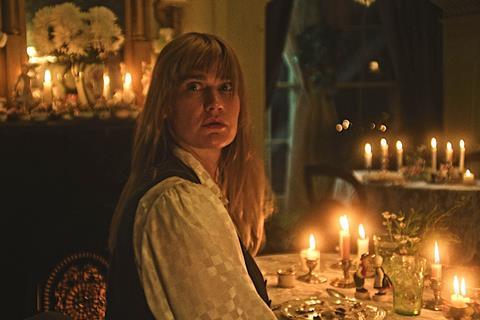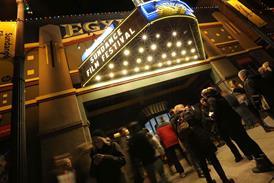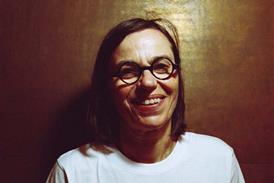Madeleine Sims-Fewer and Dusty Mancinelli pay homage to the past

Dirs/scr: Madeleine Sims-Fewer, Dusty Mancinelli. Canada. 2025. 113mins.
Down to its last sudden zoom and misty anamorphic filter, the second feature by Canadian filmmaking duo Madeleine Sims-Fewer & Dusty Mancinelli is a delicious homage to the style and atmosphere of 1970s frighteners like Don’t Look Now or The Wicker Man. Set in a gloomy country house somewhere deep in the Canadian countryside, this shape-shifting genre film does something very bold with its gauzy thrills and frills, embedding a debate about the limitless power of love inside a tense and edgy psychological thriller.
A love letter to an age when you could feel the hand turning the camera zoom
That would already be a lot, but this Berlinale Special goes further – perhaps too far – in smuggling dark humour into the mix in a final section that will be a litmus test for audiences. Some may feel that they have just been sold a very stylish shaggy dog story, others will enjoy that bait and switch. One thing is for sure: Honey Bunch has none of the extremities of the directors’ debut, the arthouse ultra-horror Violation which was picked up by specialist genre streamer Shudder. That’s not an impossible route for Honey Bunch, but it’s more likely to be circled by genre-friendly indie outlets looking for titles to tempt voracious cine-literate viewers.
The film emerges from an Ontario-based talent pool that is also a network of friends. Directors Sims-Fewer and Mancinelli and fellow actor-directors Grace Glowicki and Ben Petrie, who take the lead roles here, mix being creative and life partners, and have made work that arises directly from this meld – among them Petrie’s award-winning 2016 short My Friend Adam. That’s going to be a pretty niche dataset for most viewers, but we can all enjoy the ease and intimacy of the rapport between camera, actor and material.
After a strange, ritualistic beach-set prologue, we first begin to piece together the story of married couple Diana (Glowicki) and Homer (Petrie) as they drive through a silent backwoods landscape. In pain, with severe memory loss, she’s recovering from some trauma – she was in a coma for a good while, it will transpire – and he’s taking her to a clinic run by a famous doctor whose unorthodox methods have been known to work miracles.
In a big old mid-1970s saloon car, in period-appropriate dress, the couple arrive at a mansion in the woods that could not be more perfect. It’s a smaller, more humble take on the grand Norfolk villa of Losey’s The Go-Between or the Sussex country house where Jack Clayton’s The Innocents was filmed: there’s something derivative about its tired aping of the classical orders that resonates. And here’s Kate Dickie, oozing creepy reassurance as Farah, the mysterious doctor’s assistant, who welcomes confused Diana and doting Homer to this house of gloomy silences and antiquated medical technology.
Epousing Diana’s point of view as she tries to retrieve her memories, sort reality from hallucination and make sense of why she’s starting to feel worse, not better, Honey Bunch pushes the Gothic atmosphere using all the tricks in its period toolbox. A sudden zoom to a mysterious face in an upstairs window, a pan to something strange in the walled garden with its formal maze, net curtains that accentuate the hazy halo of what looks very much like an old-school diffusion filter. Why is Homer not there when she wakes up? Why is he spending so much time with Farah, and what was he doing on that lily-strewn grave in the grounds? The arrival of two more patients – Joseph (Jason Isaacs) and his daughter Jospehina (India Brown), who is similarly suffering a brain injury – keep us guessing about the motives of those who bring their loved ones here for treatment.
Something a little nebbish, not to say Allenesque, about Petrie’s Homer and a hint of the period parody (with its shades of Julie Christie) in Glowicki’s Diana opens up a little crack in our belief that this is a straight-up drama, one that is widened by the lack of any such distancing mechanism in the Isaacs/Brown perfomances, which possess a raw urgency. This may be deliberate – certainly, an audacious late tonal shift turns that small fissure into a crevasse which audiences are encouraged to embrace.
The film is a love letter to an age when you could feel the hand turning the camera zoom (DoP Adam Crosby is clearly having the time of his life) and when every cinematic country house came bundled with a creepy groundsman (a nice turn from British-Canadian character actor Julian Richings). Composer Andrea Boccadoro runs with the remit in a soundtrack with shades of vintage Pino Donaggio and gobbets of Goblin, while an opening song by the inimitable Ivor Cutler could not be a better tonal match for a film that manages, by turns, to be both dour and hilarious.
Production company: Cat People
International sales: XYZ Films, manon@xyzfilms.com
Producers: Becky Yeboah, Madeleine Sims-Fewer, Dusty Mancinelli
Cinematography: Adam Crosby
Production design: Joshua Howard Turpin
Editing: Lev Lewis
Music: Andrea Boccadoro
Main cast: Grace Glowicki, Ben Petrie, Kate Dickie, Jason Isaacs, India Brown, Julian Richings























